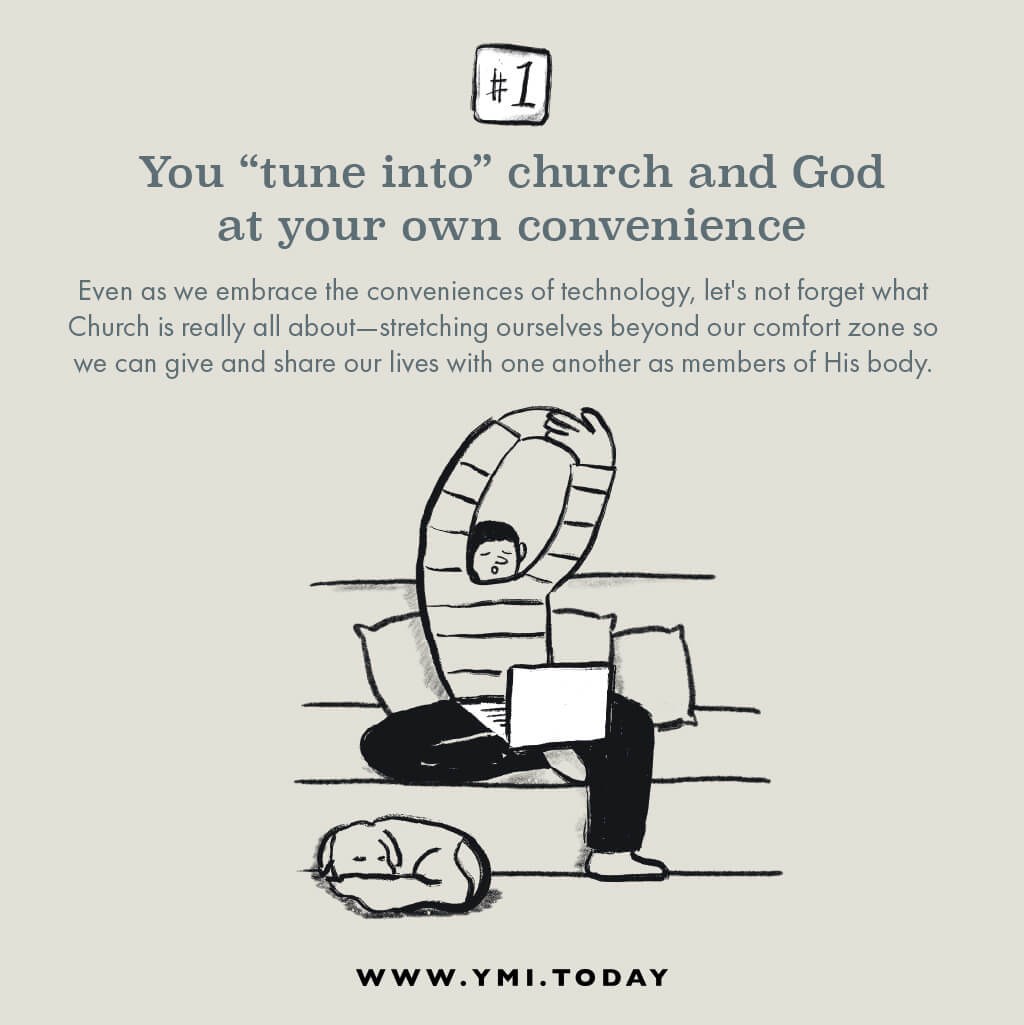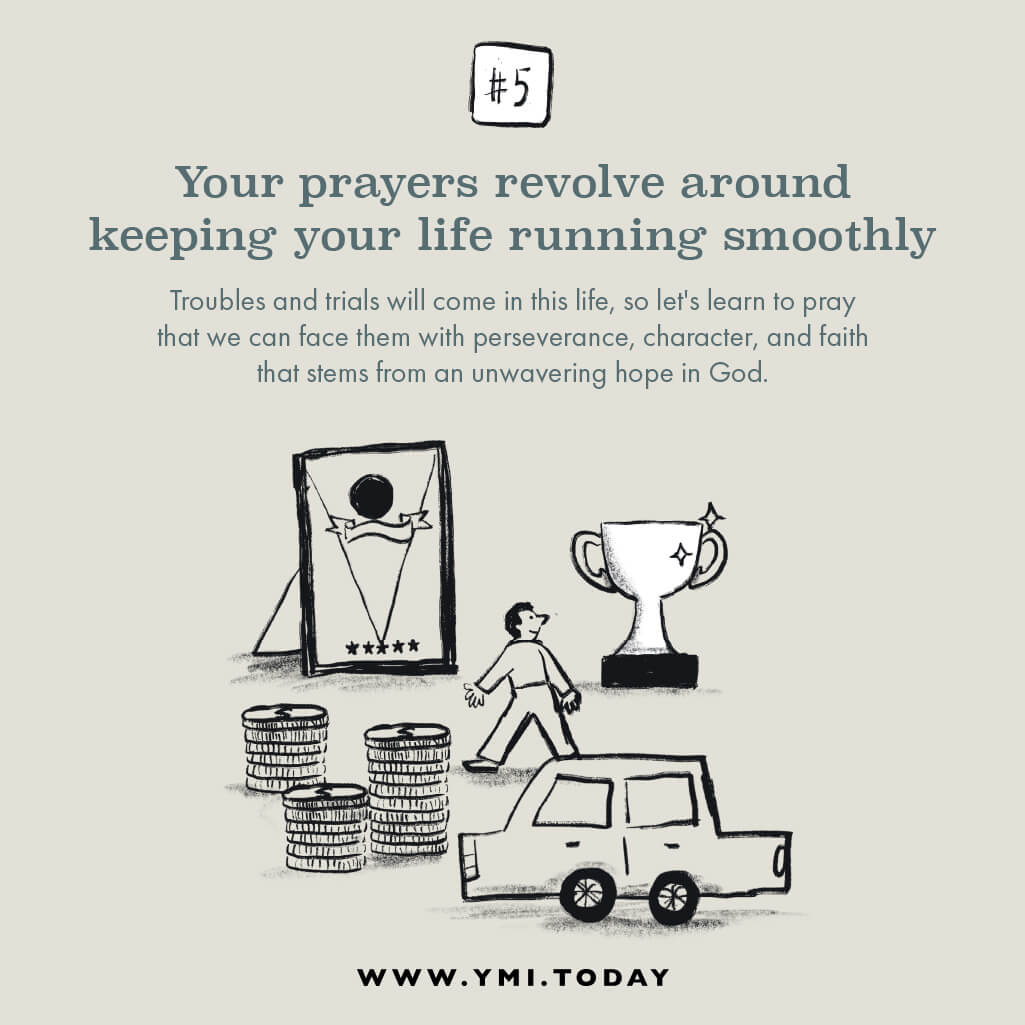6 Signs Your Christianity Is Too Comfortable
Remember how it was like when you first became a believer? Everything felt so exciting—the songs, the Bible study, the sermons. We were so thankful to have Jesus in our lives, and eager to give everything we can to serve the church.
But just like with any relationship, over time we become comfortable and complacent. Our relationship with God becomes more like a once-a-week date, same time same place, with a 10-to-15-minute check-in every other day—at best. God is still a constant in our lives, but if we’re quite honest, He’s more like a constant in the background, who we turn to when we need something or have time to spare.
The thing is, we don’t necessarily expect to feel the same way we did when we first came to faith. But if we look at our commitment, how far we go for this relationship—are we maybe a little too comfortable? So comfortable that this relationship, which should be the defining relationship that sets the course of our lives, becomes just another thing on our to-do list?
Does Christianity still define us, or have we redefined Christianity to suit us? Here are some points to help you (re)consider if you’ve become too comfortable in your Christianity:

1. You “tune into” church and God at your own convenience
When the pandemic first happened, it was comforting to know that we could still get to church with just a click. But now that there are opportunities to go back, most of us have found that it’s not been so easy to choose to wake up earlier, commute, and sit in church with masks on. We’ve been reluctant to go back, not so much because of COVID, but because…well, it’s just easier at home, where we can do it at our own time.
Same goes for our quiet time, which we tend to squeeze into our schedule like a quick break or to have one last scroll through on our phones before we shut our eyes.
Over time and with the rise of technology, it seems like we’ve become accustomed to “tune into” church whenever we want—which is far from the vision of togetherness that we see in Acts 2:44-46.
Being part of the church isn’t about tuning into an hour of sermon or Zoom Bible study, nor is it about token-giving and lip service. It’s about giving and sharing our lives with each other.
To really labour in prayer, to show up for a friend who’s lonely and/or grieving, to help those in need, and be moved to gratitude for what we have—these happen only when we move out of our comfort zones and really stretch ourselves as members of His body. True love isn’t convenient, but it is infinitely precious.

2. Most of your friends can’t tell you’re a Christian
Of course, this doesn’t mean we should stick out like a sore thumb, or make a statement at every opportunity, but sometimes we blend in a little too well in situations where we should stand out. Perhaps it’s laughing along easily at crude jokes, or keeping quiet when someone says something mean about another person. It’s also the subtle sins as well—seeing gossip as “just venting”, stealing office supplies as “just borrowing”, saying harsh things as “just being honest”.
Sure, we don’t want people to think Christians are a bunch of stuffy stuck-ups, but if we’re really honest, is it really about wanting to be accessible to others so we can share our faith, or about not wanting to be seen a certain way? Are we afraid to engage and act differently because we don’t want to risk being ostracised?
It can be easy to make justifications for why we do what we do, but as Lamentations 3:40 says, “Let us examine our ways and test them, and let us return to the Lord.”
Jesus wasn’t being poetic when He described His disciples as “not of the world any more than I am of the world” (John 17:14). Like Jesus, we’re meant to have a distinctiveness that shows others that we’re called to a different worldview and life (John 17:20-26). Oftentimes this means being countercultural in how we relate to others, whether it’s prioritising caring for people over completing tasks, responding graciously to a mean colleague/boss, or choosing to befriend those who aren’t the “cool kids” or part of the “in” crowd.

3. Your “go-to” passages in the Bible are the ones that make you feel good
When it comes to God’s Word, all of us are guilty of hearing only what we want to hear. Our lives are already stressful enough, so of course we want to start or end the day with words of comfort and affirmation. So when we read a verse like Ephesians 1:4, we focus more on the “he chose us” part and skim over the “to be holy and blameless” bit.
But God’s Word offers more than that. As Hebrews 4:12 clearly and firmly tells us:
For the word of God is alive and active. Sharper than any double-edged sword, it penetrates even to dividing soul and spirit, joints and marrow; it judges the thoughts and attitudes of the heart.
This is a good and hopeful thing, because God’s Word holds such power that when—if—we truly hear it, we cannot remain unchanged. Even as the harsh truths of the Bible cuts into our hearts, they’re not meant to leave us condemned (Romans 8:1). Rather, we’re made to see just how much we need God, and how much He has done to redeem us.
Unlike band-aids or painkillers that can only temporarily stop bleeding/pain, His Word acts like proper treatment and medicine that cleans the festering wounds and cures the ills of our souls.

4. It’s not a big deal that people in your life don’t believe in Jesus
This is a tough one, because it’s not up to us to change people’s minds and hearts. But it doesn’t mean there’s absolutely nothing we can do about it. The question is, does the knowledge that our friends and loved ones don’t know God still weigh on our minds? Do we long for them to come to know Jesus, and will that bring us to our knees in prayer?
Even though we know salvation is ultimately the work of the Holy Spirit, prayer isn’t just a glib “Thy will be done” to God. It is also asking, “God, what is Your will for me here? How can I do my part to help these people see that You are the true God? Is there something I do that hinders them from that? Is there something I can say but have chosen not to?”
Ask God not only for opportunities to speak and share His love, but also for His presence and work to be so manifest in our lives that when others look at us, they can’t help but think that God is real and true.

5. Your prayers revolve around keeping your life running smoothly
Sometimes (or oftentimes) we spend a good amount of time praying for life to be smooth-sailing:
Lord, please help me finish my work so everyone will be happy.
Lord, please give us good health so we can do our work.
Lord, please protect all the important people in my life from COVID.
Of course, we don’t want bad things to happen. But if our prayers revolve primarily around these requests, it shows that in the deepest corners of our hearts, we love our comfort more than anything else, and God inadvertently becomes the means to our comfort. One clear sign of this is when something unpleasant happens, our instinct is to immediately say, “Why, God? Why didn’t You answer my prayer?”
As author Alistair Begg puts it, “Christianity is not about how to escape from the difficulties of life – it is about how to face the difficulties of life.” Even as we face troubles and trials, instead of praying just to be spared, let us learn to pray for perseverance, character, and faith that stems from an unwavering hope in God (Romans 5:2-5).

6. You’re not excited about heaven or seeing God face to face
Let’s be honest, most of us don’t have a clear idea of what heaven will be like, and so we’ve painted this weird picture of clouds and angels playing harps all day, which doesn’t sound very exciting. Meanwhile, we’re busy setting up our “heaven on earth”, trying to tick off everything on our checklist—impressive career, great marriage, good kids, perfect home, etc.
The good things we enjoy and long for here on earth are but small and imperfect versions of the infinite goodness God is waiting to give us. Any pleasure we experience here and now should not diminish but should deepen our yearning for the good Giver Himself.
Whatever we have now won’t last (Matthew 6:19-20; Luke 12:16-21)—things break, accomplishments fade, relationships end, people die—but our place with God is eternal and our inheritance in Him is imperishable (1 Peter 1:4). So even as we go about our daily lives, or get stuck in the grind of work, let’s keep that knowledge in the forefront of our minds. May that motivate us to “seek first the Kingdom of God and His righteousness” (Matthew 6:33).














Leave a Reply
Want to join the discussion?Feel free to contribute!